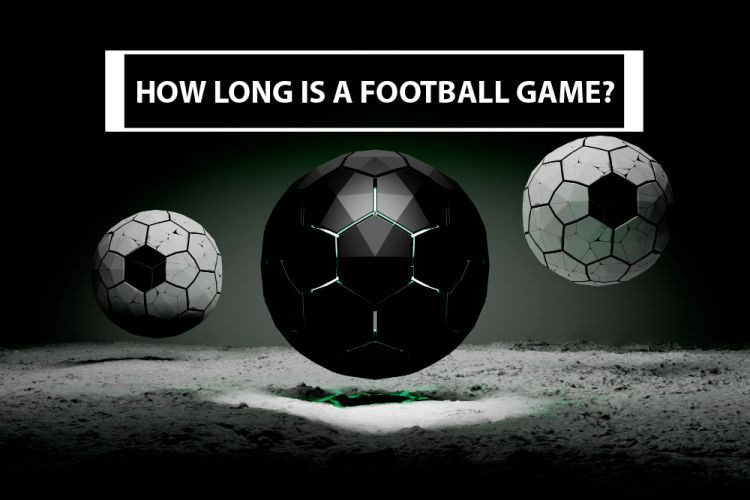
Football is a “game of two halves”, each lasting 45 minutes, resulting in a total game duration of 90 minutes. This standardized duration was set in 1866 when London and Sheffield teams faced off and agreed to play for 90 minutes during a clash. This rule has since been universally adopted in football matches around the world. However, this rule has occasional exceptions, which we will delve into in this article. Keep reading and learn everything you need to know about football game duration.

Does a football match always last 90 minutes?
Although professional games usually have a duration of 90 minutes, there are certain cases where this is different. For example, in youth games, the time limit is reduced to account for the lower fitness levels of the young players.
In both men’s and women’s games, the duration is also 90 minutes, including a 15-minute halftime break. However, both games can add additional time due to stoppages and injuries. As stated in the official regulations of the FA:
“The duration of each match shall be 90 minutes, except in special cases, provided for in these Competition Rules, where an extra 30 minutes shall be played. The Referee shall allow for time lost by the Laws of the Game or through accident or other cause, and his decision on this matter is not subject to appeal. The half-time interval shall be 15 minutes for all ties in all competitions. Both teams shall enter the field of play together, five minutes before the kick-off time, along with the Match Officials.”
Rarely do games stick to this specific time duration. A soccer match will last a few minutes longer than the 90-minute rule. As we dive deeper into the subject of football matches, we discover that timing can vary considerably. Several factors contribute to the length of a football match, including injuries, referee rulings, penalty kicks, and the age of the players on both teams.
Why is a football game 90 minutes?
The length of a football match, which should be 90 minutes, was determined in the UK. During one of the first football matches between the London and Sheffield teams, there was a lash regarding the game’s duration. Eventually, both teams agreed to implement a rule that the playing time should be 90 minutes. Once this rule was established, it became a fundamental regulation of the game that leagues worldwide embraced.
Despite these established regulations, the typical duration of a standard football match lasts 90 minutes. It is uncommon for the two halves of a soccer game to only endure for 45 minutes. Various factors like team breaks, injuries, and celebrations may contribute to extra time added to the halves, thereby extending the overall duration of the match beyond two hours.
A football match is likely beyond 90 minutes. Assuming there are no unexpected interruptions throughout the game if both teams use their permitted three-player substitutions (taking approximately 30 seconds per substitution), an extra 3 minutes will be included after either half.
The referee ultimately determines how long does a football match last, but a digital board will be used during the game to inform spectators of the minimum added time at the end of the match.
How long is a World Cup football game last?
A World Cup soccer game consists of two halves, each lasting 45 minutes. The break (the halftime) in the middle of the game usually lasts around 15 minutes. A FIFA World Cup football match will last about one and a half hours, not including any more added time for delays. In knockout games, if the score is tied at the end of regular time, there will be two extra periods of 15 minutes each. If no team leads after extra time, the winner will be decided through a penalty shootout. The delay stoppage time can vary from game to game and World Cup to World Cup.
How long does a football half-time last?
The duration of half-time in football is 15 minutes. However, let’s go into more detail about the reasons behind this mid-match break and how it came to be 15 minutes long.
Half-time is not solely meant for stretching or grabbing another drink. While it does provide a separation between the two halves of the game and allows teams to consult with managers and establish strategies for the remainder of the match, the original purpose of half-time might be unexpected.
The concept of halftime dates back to the early days of football when teams from different football associations would compete against each other. A solution was devised since these teams followed different sets of regulations based on their respective Associations. The first half of the match would be played according to one Association’s rules, while the second half would adhere to the rules of the other Association.
Regarding determining the 15-minute break, the duration of 15 minutes probably originated from the initial competitions between Eton and Rugby.
However, how long does halftime last in soccer? Initially, the halftime was only 10 minutes, but it was subsequently lengthened in 1995.
How long is a football match halftime? Internationally, the halftime period lasts for 15 minutes. The 15-minute halftime duration mustn’t be exceeded, but a brief pause for beverages is permitted during extra time between the two halves.
Extra time after 90 minutes in football
What is the current length of halftime in football? Worldwide, the halftime break lasts for 15 minutes. The halftime period must be at most the limit of 15-minute even by a minute, although a brief pause for drinks is permitted during the extra time between the halves.
Players participate in two additional 15-minute periods, and any goals made are included in the game’s overall score. If, after both 15-minute halves, the score is still the same, the game will go into a penalty shoot-out. Typically, there is a 5-minute interval between extra time and penalties.
Penalties
If the game ends in a tie after the two 15-minute halves, the competition’s winner will be determined through penalty shootouts. In this phase, players from each team will try to kick the ball past the opposing team’s goalkeeper and into the goalposts to score. Only the goalkeeper of the opposite team will be defending the shots. Each team will have five chances to score, and a different player must take each shot. It is important to note that the goals scored during the penalty shootouts do not contribute to the final score of the game.
The winner of the game is determined by the individual with the greatest number of goals out of the five attempts. If the score is still equal after the shootout, they will proceed to “sudden death.” In sudden death, the team who fails to score a shot first loses the game.
What is a Fergie time?
In English soccer, “Fergie Time” is a term coined in honour of the manager of Manchester United, Sir Alex Ferguson, the ex-manager of Manchester United. It pertains to the extra duration given to a team towards the end of a game, allowing them the opportunity to equalize or secure a victory.
This expression originated from the belief that Manchester United would often emerge victorious in matches they were losing, thanks to additional time added at the end of the game. Whether or not Fergie Time is a reality remains a topic of discussion. Fergie time refers to the excessive time that a team needs to tie or win the game at the end of the match.
How long is football game stoppage time (injury time)?
Stoppage time, or injury time, is the time added onto the end of each half of a football game. A game is almost guaranteed to exceed the 90-minute mark during injury time. Injury time refers to the duration added by the referee to compensate for interruptions in the game. These interruptions can range from player injuries, breaks for hydration, disturbances from the spectators, players deliberately wasting time, substitutions, and various other factors. If the referee determines that time has been lost during the match and needs to be accounted for, they have the authority to include additional injury time.
During the first half of the game, additional time will be included in the match following the completion of the first 45 minutes. This implies that if three minutes are allocated, the game will continue until 48 minutes before the half-time signal is given.
Once the game is restarted, it will commence in the 45th minute. This indicates that the game will consistently resume at the 45th minute regardless of any additional time due to injuries. After 90 minutes, more time can once again be included. The actual match can prolong beyond the 100th minute and further, depending on the course of the game. Henceforth, it can be inferred that every game will surpass the 90-minute mark.
Youth games
Youth games often last less than 90 minutes. The specific length will vary depending on the age group.
Typically, teams for players under the age of six play two halves of 10 minutes each, under-eights play 2 halves of 20 minutes each, under tens play two halves of 25 minutes each, twelves play 2 halves of 30 minutes each, under fourteens play 2 halves of 35 minutes each, and under sixteens play 2 halves of 40 minutes each. If all players are 17 or older, the team will play the standard two halves of 45 minutes each.
Two-legged ties
In certain competitions, each team will have to face each other twice. These matches, called two-legged ties, determine the winner by the combined score from both games.
The “away goals rule” decides the winning team if the outcome is a tie. This rule compares the goals scored by each team while playing away from their home venue.
The game will go into extra time if the scores remain level even after this calculation. The match will proceed to a penalty shootout if there is still a tie after that time. Occasionally, in very rare cases, a tied match may need to be played again from the beginning.
UK football and United States football: What’s the difference?
There are numerous differences between football in the United Kingdom and American football (NFL). Besides the fact that the former is played with the feet and the latter with the hands, the length of each game and how the games are divided are entirely different. While a standard UK football game should last at least 90 minutes, an NFL game can continue for multiple hours. An American football game has a duration of 60 minutes, with an additional 15 minutes per half if extra time is required. This one hour usually is split into two halves – 30 minutes each. However, an NFL game always exceeds the allotted time as games go over 60 minutes due to interruptions, like injuries and media downtime. Sometimes NFL games can last two hours or even three hours.
Like UK football, NFL regulations dictate a halftime interval between the two halves. As per the official rules, the halftime break is limited to a maximum of 12 minutes, with a few rare cases. One such exception is the NFL Super Bowl, the league’s annual championship game. The duration of the halftime pause during the NFL football Super Bowl surpasses the usual 12-minute limit. In reality, the break often extends beyond 30 minutes.
How much is an NFL game length?
Per official regulations, a professional football game in the NFL must have at least 60 minutes, which equals one hour. This one hour is divided into two halves, each lasting 30 minutes. Each half is divided into two quarters of 15 minutes each, resulting in four quarters. However, NFL games typically exceed the designated time limit. This is primarily due to interruptions such as breaks for media coverage and player injuries. At times, NFL games can continue for two or even three hours. The average NFL game duration is three hours. Furthermore, even when the game is paused, and the ball is out of play, the game clock continues to run.
Conclusion
A typical soccer game is 90 minutes long, consisting of two halves that are 45 minutes each. During the game, there is a 15-minute pause called ‘half-time’. There are certain instances where this duration may vary, such as in youth matches or games that involve more time and/or penalty shootouts. However, a standard football match generally abides by the FA’s official regulations and remains 90 minutes long.
Author


The Football Coach
How To Win Football Bets: A Betting Strategy To Help You Win Every Time

The Football Coach
How long is a football pitch? The complete pitch size guide












